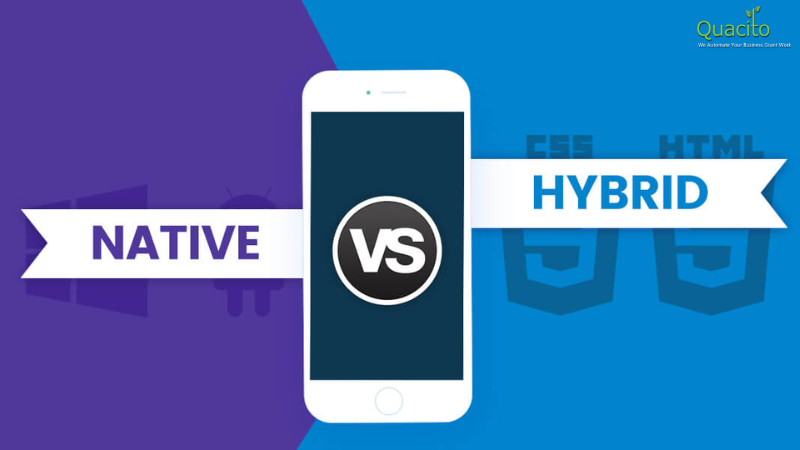
As a mobile app development company in San Antonio, we have been a part of the famous debate on native vs hybrid mobile applications. In this blog, we will simply be sharing our expertise to help you decide which one of these is the right development approach for your business.
Today, mobile apps have become one of the most dynamic business tools. The efficiency with which they build up a connection with the customers stands unparalleled. When it comes to mobile apps, there is a wide variety of services that use them for providing their users with a super convenient experience. These services can include things like banking to car-pooling and much more.
In fact, according to a mobile app report by Mobileloud, mobile users today are spending around 90% of their time using apps, and only the remaining 10% on the web.
It is predicted through statistics that mobile applications are going to generate a revenue of around $935.2 billion in the year 2023. Therefore, without a doubt, investing in a mobile application for your business is the best investment that you can make.
There are many reasons that incline our interest in mobile app development for businesses. These include mobile notifications that interact directly with customers and keep them updated easily, the improvement of customer retention due to the use of mobile applications, and much more.
As we all know, the most popular mobile development platforms include iOS as well as Android. Most of the apps developed are either on one of these platforms or both of these platforms. So, when it comes to the most crucial issue that companies face during app development, it is the decision of whether to go for building a native app or a hybrid app. And so, begins the debate of native vs hybrid mobile applications. If you are not aware of the difference between the two, then as a mobile app development company in San Antonio, we can help. In this blog, you will find the most important information on native apps as well as hybrid apps.
Let’s dig into native applications first!

These kinds of apps are programmed in order to work with specific operating systems. This means that an application if coded for iOS will not be able to work with Android and vice-versa. Native mobile applications are those which follow particular guidelines for enhancing user experience. This means that developers can build applications that leverage all the features of a given operating system. When it comes to native applications, they are required to develop separate applications for each platform. This is exactly why the development of such applications can take more time as well as more cost. However, the advantage of these kinds of applications is being better when it comes to performance.
Following are more of the benefits that one would enjoy if they choose to go for native application development for their business:
- An enhanced user experience: Native applications are known to better utilize the offline mode capabilities. Since the native apps are focused on a single platform, it increases the efficiency of the given app. With the combination of all such factors, the overall user experience gets improved.
- Better Security: Native applications have the capability of fully utilizing the hardware capabilities, unlike hybrid apps. This is exactly why they offer high data security to their users.
- Personalization: Native applications can help in adjusting the layouts. With these applications, one can enjoy the benefits of the best design while they deliver an excellent user experience.
Following are some of the disadvantages that one would face if they choose to go for native application development for their business:
- Cost: It has been observed that the development of native mobile applications comes with increased complications. This is why the price also increases. As this process demands excellent resources as well as experienced developers, it makes the entire process of developing an expensive one.
- Time-Consuming: As the applications need to be developed separately for both iOS and Android platforms, it demands more time. In fact, the development of a single native application takes more time than the development of a hybrid mobile application.
Let’s dig into hybrid applications now!

Hybrid apps have cross-platform properties which means that they can run over multiple platforms. These apps are seen as websites put into containers. They mostly use the rendering engine of the built-in operating system browsers.
Following are more of the benefits that one would enjoy if they choose to go for native application development for their business:
- Pocket-Fixing: Since there is only one base program needed, it majorly decreases development costs. Therefore, it is much cheaper.
- Saves Time: Developers only have to work on a single code, therefore saving lots of time.
- Accessibility: Hybrid apps can run on both iOS and Android with the same base code, increasing their accessibility for the users.
Following are some of the disadvantages that one would face if they choose to go for hybrid application development for their business:
- Additional costs: Many functionality issues require a native app developer leading to additional costs.
- Additional Connection Required: Some cases need you to be connected to the internet to use all features of a hybrid app.
As we mentioned above, both these sets of technologies have their own advantages as well as disadvantages. While a business can go for native mobile app development to build the best user experience as well as responsiveness within the application backed with some state-of-the-art features, their costs can go quite high. On the other hand, with Hybrid mobile app development, you can start with a lower investment and still build an application. However, costs have a chance of increasing with complexity.
All that being said, it is really a personal choice after weighing all the pros and cons for your business! As a mobile app development company in San Antonio, we can only suggest that you hire great developers for either of the decisions. If you manage to do so successfully, you’ll be on your way to a smooth sail.
